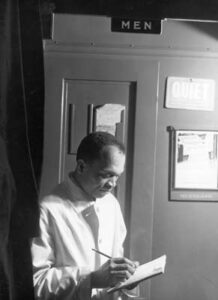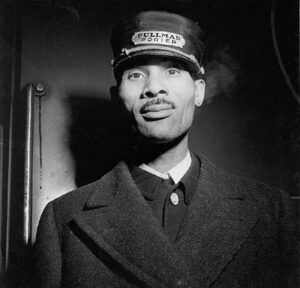Lawrence Tye
- 2003

Fellowship Title:
- Pullman Porters and the Birth of the Black Middle Class
Fellowship Year:
- 2003

The Work of a Pullman Porter
A Pullman porter was, before anything, a man who made beds. Or, as they said, made down beds, since the most taxing part was popping the upper berth from the ceiling. The lower was formed by folding down opposing seats, fastening curtains, affixing the headboard, and adding blankets, pillows and linen. An experienced porter could do all that in three to five minutes; some claimed to finish in just 90 seconds, with their hands working independently of their toilworn bodies. Which would be handy since they had to do it dozens more times a night. Pullman porter making up an upper berth aboard the “Capitol Limited” bound for Chicago, Illinois. March, 1942 Jack Delano, photographer. Library of Congress, Prints & Photographs Divisio. The biggest worry was not the bed-making itself, but when to do it, as retired porter Robert E. Turner recalled: “A wise porter will begin making some of his beds just as soon as some of his passengers begin going to the dining car for supper. If he has a heavy load, sometimes

Choosing Servility To Staff America’s Trains
He was a black man in a white jacket and sable hat. He only recently had stepped out of the cotton fields, and now was stepping onto one of the locomotives that had symbolized freedom to slavehands like him. He lit the candles that illuminated the passenger carriage, stoked the pot-bellied Baker Heater, and made down the hinged berths that transformed a day coach into an overnight compartment. He was part chambermaid, part butler, shining shoes, nursing hangovers, tempering tempers and performing other tasks that won tips and made him indispensable to the wealthy white travelers who snapped their fingers in the air when they needed him. It was the only traveling he would ever do. That much is known about the first porter to work on George M. Pullman’s railroad sleeping cars. What is not known is his name, age, birthplace, date of employment, or just about anything else about him. Historians will say the reason for that is that a fire in Chicago destroyed the early archives of the Pullman Company. But, curiously,
